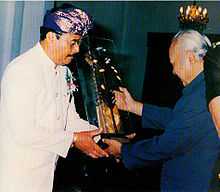Nyoman Rudana
| Nyoman Rudana | |
|---|---|
| Born |
September 17, 1948 Gelogor, Lodtunduh, in Gianyar Regency, Bali |
| Residence | Jakarta and Ubud |
| Nationality |
|
| Known for | Museum Rudana and Indonesian Senator |
| Title | Senator |
| Term | 2004–2009 |
| Successor | Incumbent |
| Religion | Balinese Hindu |
| Spouse(s) | Ni Wayan Olasthini |
| Website | |
| www.senatorrudana.com | |
Nyoman Rudana is a member of the Regional Representatives Council of Indonesia. He is the founder and owner of Museum Rudana, Rudana Fine Art Gallery and Genta Fine Art Gallery and also founder of artist support organizations in Ubud, Bali.[citation needed]
Background
Nyoman Rudana was born September 17, 1948, in the village of Gelogor, Lodtunduh, in Ubud, Bali, the third of seven children in his family.
He later became a dancer in the Balinese dance opera group during high school. He finished high school in Denpasar in 1968 and attended Teacher College in Madiun city, East Java. He returned to Bali in 1970 as an apprentice math teacher in a Junior High School. He was married in 1973, and has two sons and two daughters.
Artistic endeavors


In 1974, Rudana developed The Rudana Painter Community at the Sanur beach area to help local artists in selling their products. In 1978, he established the Rudana Fine Art Gallery in Ubud with a mission of making Balinese arts more widely known to visitors visiting the island. It was also intended to encourage local artists to develop their individual styles and grow the local art industry as well. For his work promoting Indonesian arts, The Artists Association of Indonesia presented him with the Lempad Prize in 1985.[citation needed]
Concerned that Balinese and Indonesian artistic heritage was being taken overseas, Rudana established Museum Rudana in Peliatan, Gianyar Regency. Its cornerstone was laid on 22 December 1990 with a serial of Balinese ceremony. The museum officially opened in 1995 with the goal of preserving Indonesian arts. On December 14, 1994, Rudana received the Upakarti Award from President Suharto in appreciation for his action in preserving Indonesian arts and his contribution in the development of small-scale industries in Bali.[citation needed]
In 1995, Rudana also founded The Rudana Art Foundation to help develop and promote art in Indonesia by sponsoring gifted children in studying art, performance and music. He has also developed other galleries to display Balinese arts and offer younger art lovers the opportunity to appreciate modern arts. He has also established the Ksatria Seni Award, in 2000, which is presented every four years to individuals or organizations for their dedication to their working in arts and cultures.[citation needed]
In November, 2000, Rudana received L’albero dell’umanita Award (The Tree of Humanity Award) from the Government of Italy as an appreciation for his promoting arts and brotherhood to the world.[citation needed]
Career as Senator

Nyoman Rudana was elected to the Regional Representatives Council of the Republic of Indonesia in the 2004 general election, which he is now one of four senators representing Bali. He's in charge in Ad Hoc Committee 4 responsible for the national budget and financial balance between central and local government, providing considered opinion on the result of any investigation of the state finances and selecting the members of the State Audit Board and Taxes. He also serves on the People's Consultative Assembly as well.
Community service
Nyoman Rudana founded the Ubud Rotary Club in 2001, and chaired the Bali Art Shops Association from 1980 to 1985.[citation needed]
References
- Mann, Richard, 2006. Treasures of Bali – A Guide to Museums in Bali. Gateway Books International, UK. ISBN 979-99853-4-X
External links
- Weblog of Nyoman Rudana
- Personal website of Nyoman Rudana
- Official website of The House of Regional Representatives of The Republic of Indonesia
- Military Photos.net, 2006 : Bali Quest For Autonomy from Indonesia
- Ubud Rotary Club
- Upakarti Award